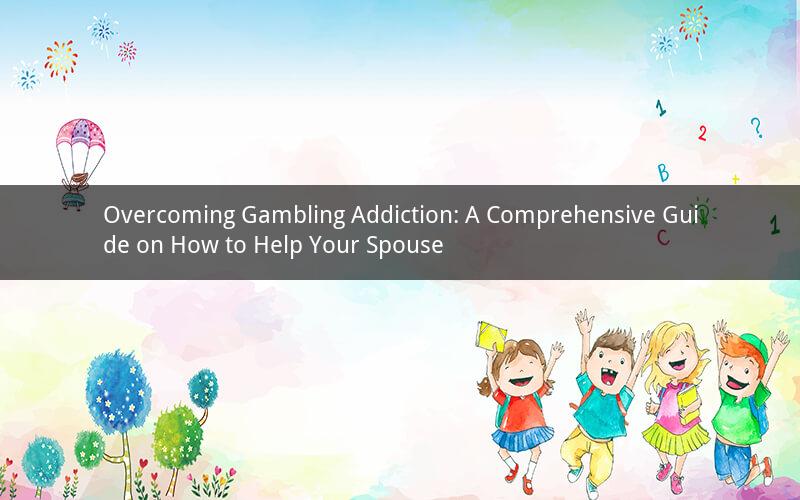
Introduction:
Gambling addiction is a significant issue that affects countless individuals and their families worldwide. It can lead to severe emotional, financial, and relational consequences. As a supportive partner, it is crucial to understand how to help your spouse with a gambling problem. This article provides an in-depth guide on recognizing the signs of gambling addiction, understanding its impact, and offering effective support.
1. Recognizing the Signs of Gambling Addiction:
Identifying the signs of gambling addiction is the first step in helping your spouse. Here are some common indicators:
a) Secretive behavior: Your spouse may start hiding their gambling activities, lying about their whereabouts, or avoiding conversations about their finances.
b) Increasing debt: One of the most apparent signs of gambling addiction is accumulating debt. Look out for late bill payments, unexplained withdrawals, or loans from friends and family.
c) Changes in behavior: Your spouse may become more aggressive, irritable, or distant. They may also start neglecting their responsibilities, such as work, household chores, or family time.
d) Obsession with gambling: Your spouse may constantly think about gambling, making it difficult to focus on other aspects of life. They may also experience cravings or a strong urge to gamble.
2. Understanding the Impact of Gambling Addiction:
Gambling addiction can have a profound impact on various aspects of your spouse's life, as well as your own. Here are some potential consequences:
a) Financial difficulties: Gambling addiction can lead to significant financial losses, resulting in debt, bankruptcy, or eviction.
b) Emotional distress: Your spouse may experience feelings of guilt, shame, anxiety, or depression due to their gambling problem.
c) Relational issues: Your spouse's gambling addiction can strain your relationship, leading to arguments, trust issues, or even separation or divorce.
d) Health problems: Chronic stress, financial strain, and neglect of personal health can result in physical and mental health issues.
3. Communicating with Your Spouse:
Once you have recognized the signs of gambling addiction, it is crucial to communicate with your spouse. Here are some tips for effective communication:
a) Choose an appropriate time and place: Find a private and comfortable setting where you can talk without interruptions.
b) Express your concerns: Clearly state your observations and concerns about their gambling behavior without being confrontational or accusatory.
c) Use "I" statements: Instead of placing blame, use "I" statements to express your feelings and needs, such as "I feel worried when I see you spending money on gambling."
d) Listen actively: Give your spouse an opportunity to express their feelings and thoughts without judgment.
4. Encouraging Professional Help:
Professional help is essential for overcoming gambling addiction. Here are some steps you can take to encourage your spouse to seek help:
a) Research treatment options: Learn about different treatment programs, such as counseling, therapy, or support groups.
b) Offer support: Let your spouse know that you are willing to support them throughout their recovery journey.
c) Encourage participation: Encourage your spouse to attend therapy sessions, support group meetings, or participate in self-help programs.
d) Provide resources: Help your spouse find resources such as hotlines, online forums, or support groups.
5. Supporting Your Spouse Through Recovery:
Supporting your spouse through recovery is a critical aspect of helping them overcome their gambling addiction. Here are some ways to offer support:
a) Be patient: Recovery is a long and challenging process. Show patience and understanding as your spouse navigates their journey.
b) Encourage healthy habits: Encourage your spouse to engage in activities that promote well-being, such as exercise, hobbies, or socializing.
c) Set boundaries: Establish clear boundaries to protect yourself from the negative impact of your spouse's gambling addiction.
d) Seek support for yourself: It is essential to prioritize your well-being during this challenging time. Consider seeking support from friends, family, or professionals.
6. Building a Stronger Relationship:
As your spouse progresses in their recovery, focus on rebuilding and strengthening your relationship. Here are some tips:
a) Foster open communication: Continue to have open and honest conversations about your feelings, concerns, and needs.
b) Celebrate milestones: Acknowledge and celebrate your spouse's progress and achievements in their recovery journey.
c) Rebuild trust: Trust is crucial for a healthy relationship. Work together to rebuild trust through transparency and accountability.
d) Spend quality time: Invest time in shared activities that promote bonding and connection.
FAQs:
1. How can I determine if my spouse's gambling problem is severe?
If your spouse's gambling behavior is causing financial, emotional, or relational distress, and they are unable to control it, it is likely a severe problem.
2. What should I do if my spouse refuses to seek help?
Encourage your spouse to seek help by expressing your concerns, offering support, and highlighting the negative consequences of their gambling addiction. If they continue to refuse, consider seeking guidance from a professional counselor or therapist.
3. How long does it take to overcome a gambling addiction?
The duration of recovery varies from person to person. Some may experience significant progress within a few months, while others may require ongoing support and treatment for years.
4. Can gambling addiction be cured?
While there is no quick fix for gambling addiction, it can be effectively managed through professional treatment, support, and lifestyle changes.
5. How can I maintain my own mental health during this challenging time?
Prioritize your well-being by seeking support from friends, family, or professionals. Engage in self-care activities, such as exercise, meditation, or hobbies, to maintain your mental and emotional health.